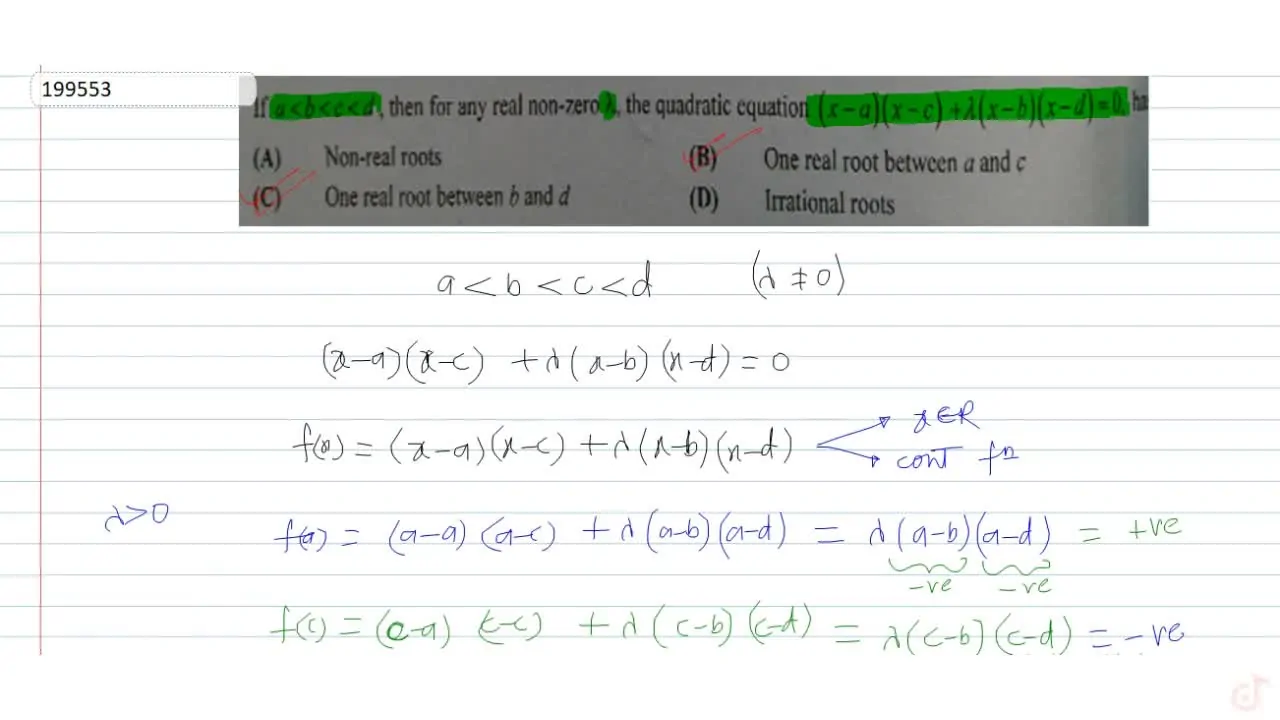If a<b<c<d, then for any real non-zero λ, the quadratic equation (x−a)(x−c)+λ(x−b)(x−d)=0,has
a<b<c<d
μ(x−a)(x−c)+λ(x−b)(x−d)=0
Let the corresponding expression be
f(x)=μ(x−a)(x−c)+λ(x−b)(x−d)
f(a)=λ(a−b)(a−d)
f(c)=λ(c−b)(c−d)
⇒f(a)f(c)=λ2(a−b)(a−d)(c−b)(c−d)<0
⇒f(a)andf(c) are of opposite signs
Hence, root of the equation lies between a and c . Therefore , the
roots are real for all real μandλ.
Related Playlists
- BOOK - CENGAGECHAPTER - THEORY OF EQUATIONSEXERCISE - Exercise (Single)89videos
THEORY OF EQUATIONS
- BOOK - CENGAGECHAPTER - THEORY OF EQUATIONSEXERCISE - Exercise (Multiple)38videos
THEORY OF EQUATIONS
- BOOK - CENGAGECHAPTER - THEORY OF EQUATIONSEXERCISE - Exercise 2.1211videos
THEORY OF EQUATIONS
- BOOK - CENGAGECHAPTER - STRAIGHT LINESEXERCISE - JEE Advanced Previous Year4videos
STRAIGHT LINES
- BOOK - CENGAGECHAPTER - THREE DIMENSIONAL GEOMETRYEXERCISE - Question Bank20videos
THREE DIMENSIONAL GEOMETRY
Similar Questions
If a<b<c<d, then for any real non-zero λ, the quadratic equation (x−a)(x−c)+λ(x−b)(x−d)=0,has
View SolutionIf a<b<c<d the equation (x−a)(x−c)+λ(x−b)(x−d)=0 has real roots for
View SolutionIf a<b<c<d, then the equation (x−a)(x−c)+2(x−b)(x−d)=0 has ( a) Imaginary roots (b) equal roots (c) distinct real roots (d) none of these
View SolutionIf a<b<c<d, then the quadratic equation (x−a)(x−c)+2(x−b)(x−d)=0 has its roots
View SolutionIf a<b<c<d, then the eqution 3(x−a)(x−c)+5(x−b)(x−d)=0 has
View SolutionIf a<b<c<d, then the roots of the equation (x-a)(x-c)+2(x-b)(x-d)=0 are
View SolutionIf a<b<c<d then show that (x−a)(x−c)+3)x−b)(x−d)=0 has real and distinct roots.
View SolutionThe least positive integeral value of real λ so that the equation (x−a)(x−c)(x−e)+λ(x−b)(x−d)=0,(a>b>c>d>e) has distinct real roots is __________.
View SolutionIfa,b,c,d∈R such that a<b<c<d, then roots of the equation (x−a)(x−c)+2(x=b)(x−d)=0
View SolutionIf a<0<b, then ∫bax|x|dx=
View Solution


